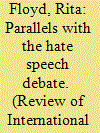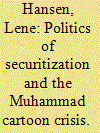| Srl | Item |
| 1 |
ID:
157725


|
|
|
|
|
| Summary/Abstract |
This article argues that public expressions of Islamophobia are best understood as securitising requests (that is, calls on powerful figures/bodies to treat an issue in security mode so that extraordinary measures can be used to combat it), especially in those cases where Muslims are feared and disliked because of the perception that Islamic people are prone to terrorism. This article argues that harmful and derogatory securitising requests targeting racial, ethnic, or religious minorities are on par with hate speech and it highlights the fact that many contemporary societies are now seeking legal protections against such security speech (expressed most notably in the desire to ban Islamophobia). It is from this perspective that this article poses an important research question: With a view to protecting those adversely affected, are legal protections against harmful and offensive securitising requests justified? The research question can be answered by drawing parallels to the existing hate speech debate in legal and political theory. The research reveals that, although the case against legal protections of harmful and defamatory security speech is ultimately more convincing, security speech alone can be so damaging that it should be informed by a number of ethical considerations. This article goes on to suggest three criteria for governing the ethics of requesting securitisation. As such this article fills a lacuna in the ‘positive/negative debate’ on the ethics of security that has engaged with securitisation, but that has failed to consider the ethics of speaking security.
|
|
|
|
|
|
|
|
|
|
|
|
|
|
|
|
| 2 |
ID:
109589


|
|
|
|
|
| Publication |
2011.
|
| Summary/Abstract |
A broad array of authors and schools have influenced Barry Buzan and Ole Wæver's formulation of securitization theory, including John L. Austin, Jacques Derrida and Carl Schmitt. This article draws attention to and strengthens the post-structuralist elements in the writings of Buzan and Wæver, as this part of the theory has received less attention than those attributable to Schmitt and Austin. Starting from securitization theory as developed by Buzan and Wæver and engaging with later expansions of the theory, I suggest a post-structuralist framework built around three questions: Through which discursive structures are cases and phenomena represented and incorporated into a larger discursive field? What is the epistemic terrain through which phenomena are known? And, what are the substantial modalities that define what kind of an issue a security problem is? The last part of the article brings this framework to bear on the 'Muhammad cartoon crisis' that began with the publication of 12 cartoons depicting the Prophet Muhammad in the Danish newspaper Jyllands-Posten in 2005.
|
|
|
|
|
|
|
|
|
|
|
|
|
|
|
|